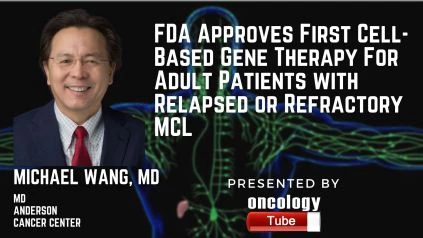Michael Wang, MD at MD Anderson discusses Kite Pharma’s FDA Approves First Cell-Based Gene Therapy For Adult Patients with Relapsed or Refractory MCL
US. U.S. Food and Drug Administration ( FDA) has granted TecartusTM (brexucabtagene autoleucel, formerly KTE-X19), the first and only approved chimerical antigen receptor (CAR ) T cell therapy for the treatment of adult patients with relapsed or refractory mantle cell lymphoma (MCL). Following a priority review and FDA Breakthrough Therapy Classification, approval of this one-time therapy is based on the findings of ZUMA-2, a single-arm, open-label trial in which 87 percent of patients responded to a single Tecartus infusion, including 62 percent of patients who obtained a full response (CR). 18 percent experienced Grade 3 or higher cytokine release syndrome (CRS) among patients assessable for protection and 37 percent experienced Grade 3 or higher neurological toxicities.
Multimedia features for this press release. Here is the complete release: https:/www.businesswire.com/news/home/20200724005428/en/en/20200724005428
“There are still substantial treatment disparities for patients with MCL who are improving after initial therapy, despite encouraging advances,” said Michael Wang, MD, ZUMA-2 Lead Investigator and Professor, Department of Lymphoma and Myeloma, Division of Cancer Medicine, University of Texas MD Anderson Cancer Center. “Most patients suffer from high-risk illness, and are more likely to fail to improve even after subsequent treatment. The availability of Tecartus as the first-ever cell therapy for patients with relapsed / refractory MCL offers a significant alternative, with a response rate of almost 90% and early clinical evidence indicating long-lasting remissions in subsequent treatment lines.
Christi Shaw, Chief Executive Officer of Kite, said, “Kite is committed to bringing the promise of CAR T therapy to patients with hematological cancers and, as such, we are proud to launch our second cell therapy.” “I extend my gratitude to Kite ‘s patient study participants, caregivers, clinical researchers, regulators and devoted colleagues who have helped make this approval possible, and we look forward to working with the lymphoma community to provide patients with relapsed or refractory MCL with this potentially revolutionary treatment.”
In its product mark, Tecartus has a Boxed Warning about the dangers of CRS and neurologic toxicities. The FDA has approved a Risk Assessment and Mitigation Strategy (REMS) for Tecartus and combined it with the Yescarta ® (axicabtagene ciloleucel) REMS. The REMS curriculum will advise and educate healthcare practitioners on the risks associated with the treatment of Tecartus, and REMS training and certification will be an important part of the final authorisation for the centers providing Tecartus. You can find more information on the REMS software at www. YescartaTecartusREMS.com. For Essential Safety Details please see below.
MCL is an uncommon type of non-Hodgkin lymphoma (NHL) that occurs from cells that originate in the lymph node’s “mantle region” and primarily affects men over the age of 60. Following relapse, MCL is extremely aggressive, with many patients improving following therapy.
Meghan Gutierrez, Chief Executive Officer of the Lymphoma Research Foundation, said: ‘This approval is the first CAR T cell therapy approved for mantle cell lymphoma patients and represents a new frontier in the treatment of this disease. “Researchers have made tremendous strides in our understanding of this disease over the past decade and we have seen a rise in patient clinical trials, which we hope will continue to enhance treatment methods and choices for people with mantle cell lymphoma. Today’s news builds on this advancement and gives hope that cell patients and their loved ones will be mantled.
Tecartus will be assembled in El Segundo, California, at Kite ‘s commercial manufacturing facility. Kite showed a 96% manufacturing success rate in the ZUMA-2 trial and a median manufacturing turnaround time of 15 days from leukapheresis to product delivery. Pace of development is highly important for advanced disease patients who are extremely ill and at risk of rapid progression.
Kite Konnect ®, an advanced technology platform that offers information and assistance during the therapy process for Kite’s commercialized CAR T therapies, including courier monitoring for shipments and development status updates, will work with patients whose healthcare providers have prescribed Tecartus therapy. Kite Konnect offers assistance to qualifying patients obtaining Yescarta and Tecartus and offers information to assist their patients in the healthcare teams. Patients and healthcare professionals can contact Kite Konnect at www. KiteKonnect.com or 1-844-454-KITE (1-844-454-5483).
KTE-X19 is currently under review in the European Union and has been awarded the European Medicines Agency’s Priority Medicines (PRIME) designation for relapsed or refractory MCL.
Tecartus Trial Results
Data from the ongoing, single arm, open-label ZUMA-2 pivotal trial supports the approval of Tecartus. The study enrolled 74 adult patients with relapsed or refractory MCL who had previously undergone chemotherapy containing anthracycline or bendamustine, anti-CD20 antibody therapy and an inhibitor of Bruton tyrosine kinase (ibrutinib or acalabrutinib). The primary endpoint, as assessed by the Independent Radiological Review Committee (IRRC), was the objective response rate (ORR) per Lugano Classification (2014), defined as the combined rate of CR and partial responses.
In the study, 87 percent of patients responded to a single infusion of Tecartus (n=60 evaluable for efficacy analysis), including 62 percent of patients who achieved a CR. The follow-up was at least six months after their first objective disease response, for all patients. The median response period has not yet been achieved.
In the study, 18 percent of patients experienced Grade 3 or higher CRS and 37 percent experienced neurologic incidents (n=82 assessable for safety). Anemia, neutropenia, thrombocytopenia, hypotension, hypophosphatemia, encephalopathy, leukopenia, hypoxia, pyrexia, hyponatremia, hypertension, infection-pathogen not defined, pneumonia, hypocalcemia and lymphopenia were the most common (approximately 10%) Grade 3 or higher adverse reactions. With a Risk Assessment and Mitigation Plan (REMS), the FDA approved Tecartus. The Tecartus REMS is now called the “Yescarta (axicabtagene ciloleucel) and Tecartus (brexucabtagene autoleucel) REMS Program” (www. YescartaTecartusREMS.com) in conjunction with the Yescarta REMS program.

